Когда в последние месяцы медиа или политики говорили о борьбе с коррупцией, в основном речь шла о коррупционных расследованиях или рассмотрении дел в судах. И это неудивительно: в водовороте войны запрос украинцев на справедливое наказание значительно вырос — и когда речь о государственных предателях или наводчиках, и когда о взяточниках.
Однако вопрос антикоррупции значительно шире и охватывает гораздо больше вещей, которые могут обеспечить настоящие успехи в такой борьбе. И здесь важны не только результаты, но и возможности вообще их достигать, потому что без способности не может быть и речи об эффективности. Именно для того, чтобы понять возможности антикоррупционной экосистемы, Transparency International Ukraine провела второе исследование управления и взаимодействия органов антикоррупционной инфраструктуры, которое охватывает почти три года их деятельности (2021-2023). Так насколько возможности антикорорганов сходятся с результатами?
Как мы уже упоминали, результативность борьбы с коррупцией люди в основном замечают по информации о подозрениях и приговорах, то есть речь идет о сфере, которую охватывает связка НАБУ-САП-ВАКС. И здесь важно понять, что способность одного из этих органов непосредственно влияет на возможности других. И, как следствие, ошибки или препятствия на этапах расследования или судебного разбирательства становятся причиной меньшего количества качественных решений по коррупционным делам.
Высокие ставки НАБУ
Национальное антикоррупционное бюро Украины (НАБУ) — бесспорно, самый известный антикоррупционный орган в нашей стране. Примечательно, что именно Бюро показало наибольший рост в нашей оценке: по сравнению с данными 2020 года показатели способности органа выросли с 3,6 до 4,3 балла из возможных пяти. А это уже достаточно высокая оценка.
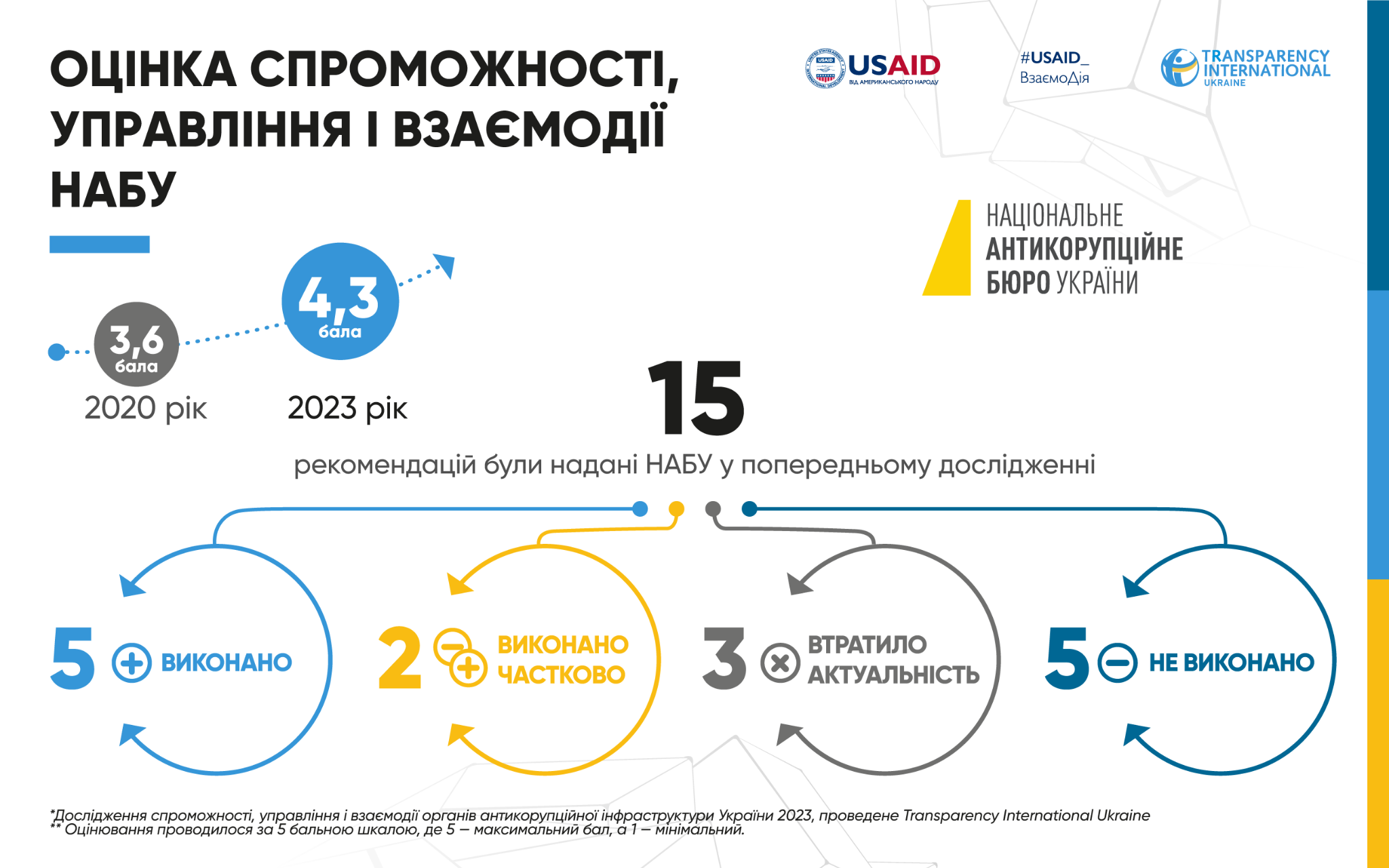
Прежде всего на этот балл повлияло отсутствие заметных проблем с менеджментом. И даже несмотря на начало полномасштабной войны и остановку работы комиссии более чем на полгода, конкурс по отбору нового директора НАБУ таки состоялся. Он длился менее года, что хоть и долго, но по сравнению с конкурсом Специализированной антикоррупционной прокуратуры (САП), например, это стало большим прогрессом. Поэтому после назначения Семена Кривоноса главой Бюро в марте 2023 года НАБУ и САП усилили сотрудничество и заметно активизировали расследование дел о коррупции на самом высоком уровне. Хотя ряд экспертов объективно отмечают, что реальные результаты работы нового директора мы увидим минимум через год после назначения. Потому что все успехи весны 2023-го, включая топ-кейс главы Верховного суда Князева, — наработки детективов и бывшего руководства Бюро. Но они действительно не были нивелированы новым.
Это удалось в том числе благодаря улучшению законодательства о деятельности НАБУ. В частности, благодаря устранению противоречия между Конституцией и Законом «О Национальном антикоррупционном бюро Украины» и определению, что НАБУ является центральным органом исполнительной власти со специальным статусом. Был уточнен порядок осуществления аудита эффективности деятельности Национального бюро. Также были внесены изменения, которыми четко определены полномочия Кабинета министров по назначению на должность директора Национального антикоррупционного бюро и его увольнение. Хотя, опять же, в процессе конкурсного отбора возник ряд проблемных моментов, вследствие которых отсеялись фавориты общественности — профессионалы из самого НАБУ. Но так или иначе саму процедуру конкурса можно считать успешной.
Сейчас мы наблюдаем значительное оживление в расследовании топ-коррупционных дел НАБУ и САП. Но такое увеличение тоже имеет свою цену, в том числе и в вопросе количества привлеченных к таким процессам работников. Чтобы справиться с нарастающей нагрузкой на органы антикоррупционной экосистемы, необходимо пропорционально увеличить количество работников НАБУ, прокуроров САП, судей Высшего антикоррупционного суда (ВАКС) и работников аппарата суда. Потому что от способности каждого из этих институтов зависит эффективность работы всего звена НАБУ-САП-ВАКС.
Причем в своем отчете по Украине как стране-кандидату Европейская комиссия отдельно указала на необходимость увеличить численность работников НАБУ, в частности дополнительного персонала для работы над расследованиями, — а это детективы, аналитики и технические работники.
Сейчас согласно профильному закону общая численность работников центрального и территориальных управлений НАБУ не должна превышать 700 человек. В парламенте уже зарегистрированы два законопроекта об увеличении количества сотрудников Бюро — в обоих предлагается довести ее до 1000 человек, что позволит усилить функцию досудебного расследования. Сегодня в первом чтении Рада проголосовала законопроект №10203-1, по которому штат НАБУ должен увеличиться с 700 до 1000 работников в три волны: закроют по 100 вакансий в 2024 году, 2025-м и 2026-м. И это правильное решение, потому что набрать аж 300 квалифицированных специалистов за год, а потом еще интегрировать новые кадры в работу Бюро — это довольно серьезный вызов. Стоит также понимать, что для полноты картины надо иметь полный текст законопроекта, который был проголосован, пока его нет в открытом доступе.
Другая важная и, что печально, давняя проблема — обеспечение права НАБУ на автономное прослушивание. Необходимое законодательство было принято еще осенью 2019-го, но прописанные в нем нормы до сих пор не реализованы на практике. Сейчас СБУ имеет необходимое оборудование, и НАБУ может получать его по запросу. Но поскольку Бюро является отдельным государственным органом и должно выполнять свою работу независимо и беспристрастно, ему нужны собственные инструменты для обеспечения таких своих функций.
Не менее важно для эффективных антикоррупционных расследований создание независимого органа, который будет отвечать за проведение экспертиз по делам о коррупции на высоком уровне. Это могло бы положительно повлиять на скорость и качество расследований НАБУ, обеспечив осуществление экспертиз эффективно, независимо, своевременно и, что особенно важно, без давления. А сегодня сотрудники Бюро часто не могут быстро провести экспертизу, потому что на нее уже выстроилась очередь дел, и это значительно затягивает расследование.
Существенные препятствия создают и печально известные «поправки Лозового». Последствия их применения уже можно увидеть в решениях о закрытии уголовных производств в ряде дел из-за, по мнению судей, неправильного субъекта продления сроков досудебного расследования. Среди громких дел, которые были закрыты благодаря «поправкам Лозового», — дела «Укрзализныци», братьев Дубневичей, Ощадбанка, первый эпизод дела «Роттердам+», дело Альперина.
Поэтому, чтобы исправить этот недостаток, парламенту необходимо усовершенствовать материальное и процессуальное уголовное законодательство.
Что приятно, НАБУ показывает себя как стабильная, эффективная и независимая организация, демонстрирует рост и регулярное внедрение лучших практик в работе, что сказывается на результатах всей антикоррупционной системы. И во многом это было бы невозможно без эффективного взаимодействия с САП.
САП с перспективой независимости
В то же время Специализированная антикоррупционная прокуратура в результате нашего исследования получила невысокие 3,5 балла из возможных пяти, и для этого есть причины.
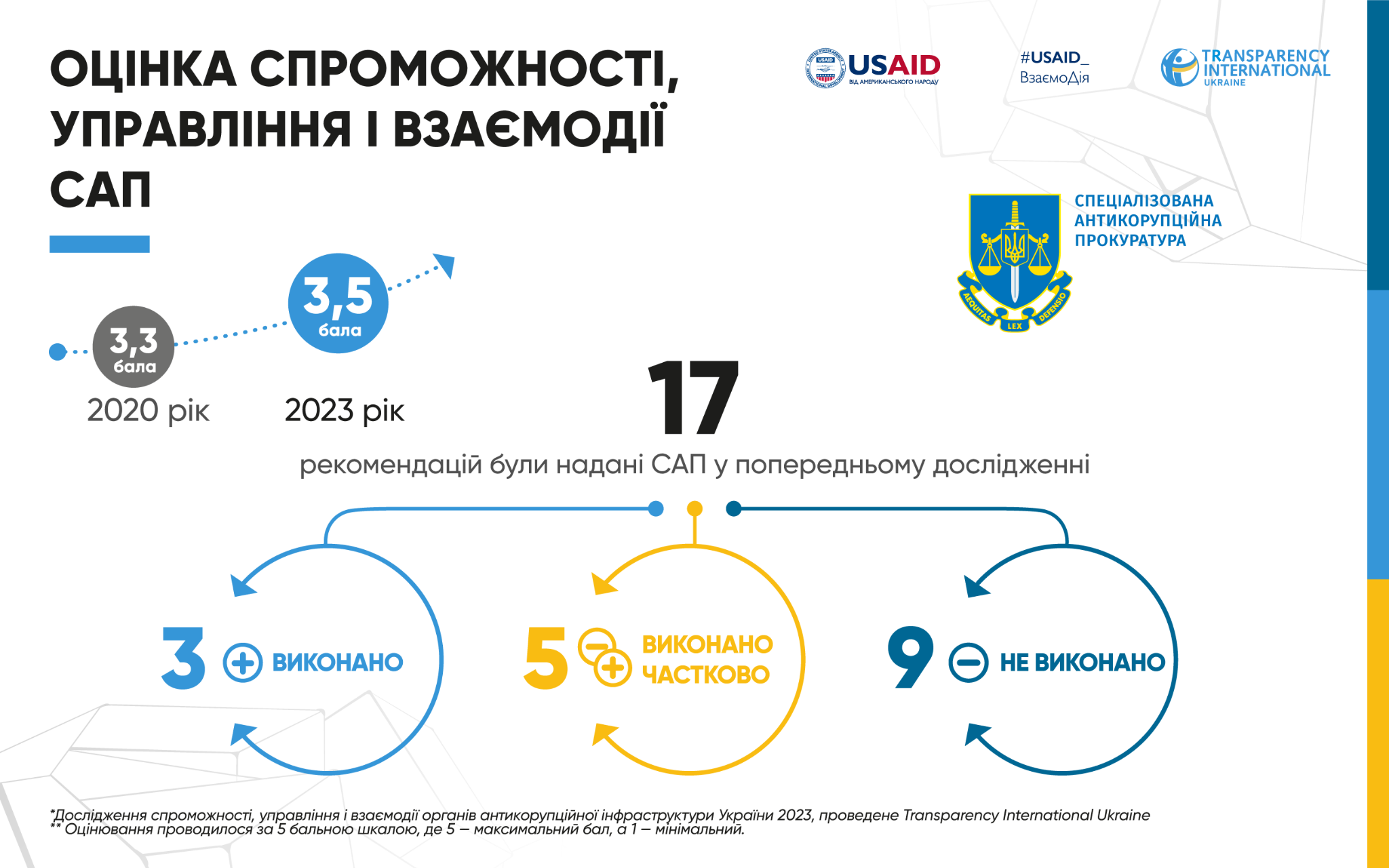
С августа 2020-го САП почти два года не имела полноценного руководителя. Ситуация на тот момент сложилась абсурдная: по состоянию на июнь 2022 года победитель соответствующего конкурса был известен уже полгода как, но так и не назначен комиссией.
Здесь важно напомнить, что хотя прокуроры САП и имеют дополнительные институциональные гарантии независимости от вмешательства в их работу по сравнению с другими подразделениями прокуратуры, все же остается важный нюанс. При отсутствии полноценного руководителя все действия исполняющего обязанности должен был согласовывать со своей стороны генеральный прокурор (на тот момент Ирина Венедиктова), а это могло создать и создавало возможности для вмешательства в ход антикоррупционных расследований. Напомним, что именно так удалось «убить» дело в отношении Олега Татарова. И, конечно, это уже указывает на уменьшение возможностей для САП выполнять возложенные на нее функции.
И хотя в июне 2022-го Александр Клименко таки возглавил Специализированную антикоррупционную прокуратуру, ряд проблем ведомства никуда не исчез. В частности речь идет и об отсутствии реальной независимости и собственного юридического лица.
Поэтому орган до сих пор не имеет собственной канцелярии и секретно-режимного подразделения. То есть пока невозможно написать непосредственно в САП — вся корреспонденция проходит через Офис генерального прокурора, что опять же создает опасность утечки чувствительных данных. Так же это увеличивает и риск банальной человеческой ошибки, когда какое-то письмо просто не дойдет до конечного адресата. Опять же из-за отсутствия собственного юридического лица САП не имеет собственного сайта для распространения информации и не может создать и воплощать коммуникационную стратегию.
Некоторые ограничения касаются и возможностей руководителя САП, что влияет на ее работу и может производить впечатление, будто антикорпрокуратура — недостаточно эффективный орган.
Например, сейчас Александр Клименко не может самостоятельно направлять запросы об экстрадиции лиц, а в делах НАБУ-САП немало фигурантов как раз и скрываются за границей. Такие запросы можно отправить только через генерального прокурора, и это влияет прежде всего на репутацию Специализированной антикоррупционной прокуратуры. Глава САП также не может самостоятельно зарегистрировать в Едином реестре досудебных расследований (ЕРДР) производство в отношении народного депутата.
Интересно, что профильное законодательство о САП, в отличие от других органов антикоррупционной экосистемы, почти не менялось за восемь лет и иногда утратило способность адекватно отвечать на вызовы, возникшие перед институцией в течение ее деятельности.
Указанные нами проблемы так же беспокоят и Европейскую комиссию. В своем отчете она также указала, что САП нуждается в дополнительной защите от возможного неправомерного вмешательства. Устранить этот риск можно, в частности, путем усовершенствования процедур отбора руководителя САП и ее ключевых должностных лиц, а также повышения организационной и процессуальной автономии САП и улучшения системы подотчетности.
Стоит отметить, что сегодня, 21 ноября, парламент поддержал в первом чтении правительственный законопроект №10060 «О внесении изменений в Уголовный процессуальный кодекс Украины и другие законодательные акты Украины относительно усиления самостоятельности Специализированной антикоррупционной прокуратуры». Этот законопроект должен решить проблему отсутствия в САП отдельного юридического лица и усовершенствовать конкурс на должность главы прокуратуры. Также он предусматривает создание отдельной дисциплинарной комиссии для САП и проведение внешнего независимого аудита органа. Хотя законопроект и содержит ряд недостатков, например отсутствие полномочий у руководителя САП начинать уголовное производство в отношении нардепов, самостоятельно направлять запросы об экстрадиции, в целом он закладывает основные основы независимости САП и соответствует требованиям Европейской Комиссии по этому вопросу. Этот законопроект также требует более глубокого анализа после обнародования полного текста документа.
Еще один краеугольный камень — это отсутствие внешнего аудита эффективности работы САП, который, например, предусматривается для НАПК и НАБУ. Именно поэтому TI Ukraine подчеркивала необходимость ввести такую форму оценивания, чтобы понимать сильные и слабые места и зоны роста.
В то же время мы уже можем говорить о формировании вполне качественного взаимодействия в сотрудничестве между НАБУ и САП. Интересно, что результаты этого взаимодействия могут как раз и вызвать у украинцев впечатление, что уровень коррупции в стране значительно вырос по сравнению с предыдущими годами. А все потому, что где-то с осени прошлого года мы стали свидетелями значительно большего количества объявленных подозрений в коррупции, и, соответственно, количество новостных заголовков об этом тоже увеличилось, что может создать в определенной степени ложное впечатление о росте самой коррупции, а не расследований по ней.
Однако для того, чтобы заголовки в медиа производили более приятное впечатление, необходимы приговоры, и это уже задача для Высшего антикоррупционного суда.
ВАКС на пике доверия, но есть нюансы
Высший антикоррупционный суд в нашем исследовании получил самую высокую оценку — 4,6 балла из пяти возможных. Причин для таких успехов несколько.
Прежде всего стоит напомнить, что ВАКС — самая новая институция в системе уголовной юстиции, поэтому еще в первом нашем исследовании его баллы были самыми высокими. Однако одно дело получить высокую оценку из-за незначительного срока работы, а другое — удержать такую репутацию и даже улучшить ее. Антикорсуду это удалось.
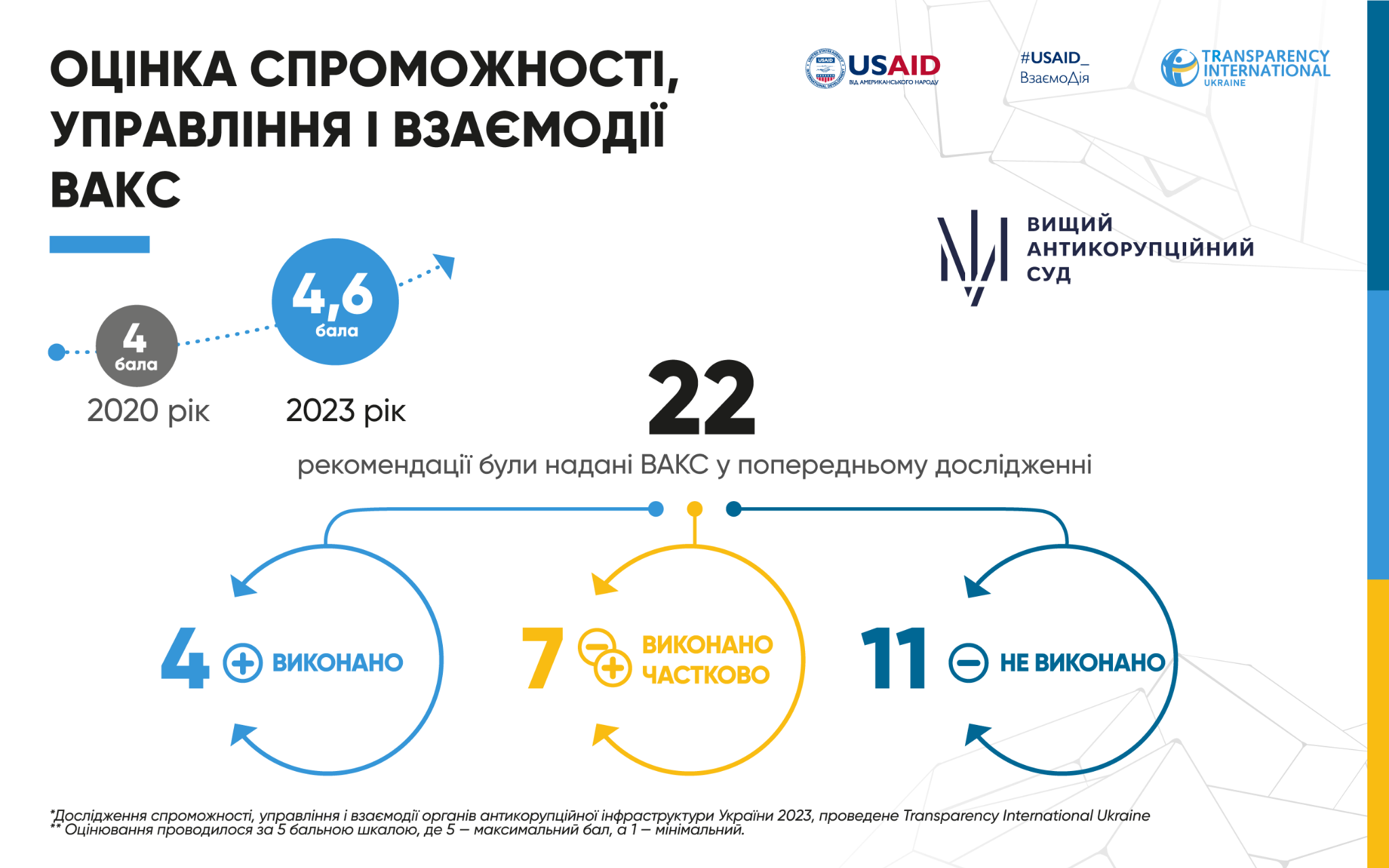
С большинством вызовов, стоящих перед институцией, ВАКС и стейкхолдеры справляются удачно. Судьи и работники аппарата суда соблюдают законодательство по вопросам предотвращения коррупции, регулярно коммуницируют о результатах рассмотрения дел, и в целом, когда речь идет об этом суде, создается впечатление о действительно политически беспристрастной и независимой институции. Серые пятна в работе учреждения возникали, разве что когда речь шла о проблемах с засекречиванием отдельных приговоров, а также с финансированием. Но сейчас они не оказывают критического влияния на общее доверие к учреждению.
Здесь напомним, что в своем исследовании мы не оценивали эффективность реализации собственно материального и процессуального уголовного законодательства, на основании которого функционирует ВАКС. Но проблемы, присущие всем судам относительно несогласованной практики применения отдельных положений законодательства, а также продолжительности судебного рассмотрения отдельных дел, касаются и Высшего антикорсуда.
Другой вопрос — нагрузка на судей ВАКС. Ведь хотя дел, находящихся на его рассмотрении, и меньше, но количество судей также небольшое, а все дела слушаются коллегиально, то есть в судебных разбирательствах принимают участие по три судьи. Именно поэтому Еврокомиссия в своем отчете, как ранее и мы в рекомендациях к исследованию, указывала на необходимость увеличить количество судей ВАКС для того, чтобы справиться с нагрузкой, которая будет только расти.
Еще вопрос — отсутствие помещения для Апелляционной палаты ВАКС с учетом увеличения штата, а также надлежащее финансирование текущих потребностей суда и конкурентной заработной платы и судейского вознаграждения.
В то же время нужно сказать, что буквально незадолго до публикации исследования в медиа появились отдельные претензии к решениям некоторых судей ВАКС. А также к участившейся практике засекречивания решений. Из самых громких таких практик, где ВАКС засекретил решения, можно назвать приговоры экс-министру экологии Злочевскому по делу о супервзятке, экс-главе Счетной палаты Пацкану, адвокату Горецкому по делу о взятке Князеву. И это в определенной степени негативные сигналы, которые следует учитывать. Однако вместе с тем следует понимать, что количество таких засекреченных приговоров невелико: среди 150 засекречено только 12.
Неусвоенные уроки НАПК
Самая масштабная задача среди всех органов антикоррупционной экосистемы стояла перед Национальным агентством по вопросам предотвращения коррупции, которое должно формировать антикоррупционную политику в Украине в целом. И в этой сфере, к сожалению, за последние три года случалось разное.
Способность НАПК мы оценили в 3,7 балла из пяти. И это при том, что именно Нацагентство стало единственным органом, который мы оценивали не дважды, а трижды. Вообще о способности НАПК можно говорить больше всего еще и потому, что это единственный антикоррупционный орган, который прошел внешний независимый аудит.
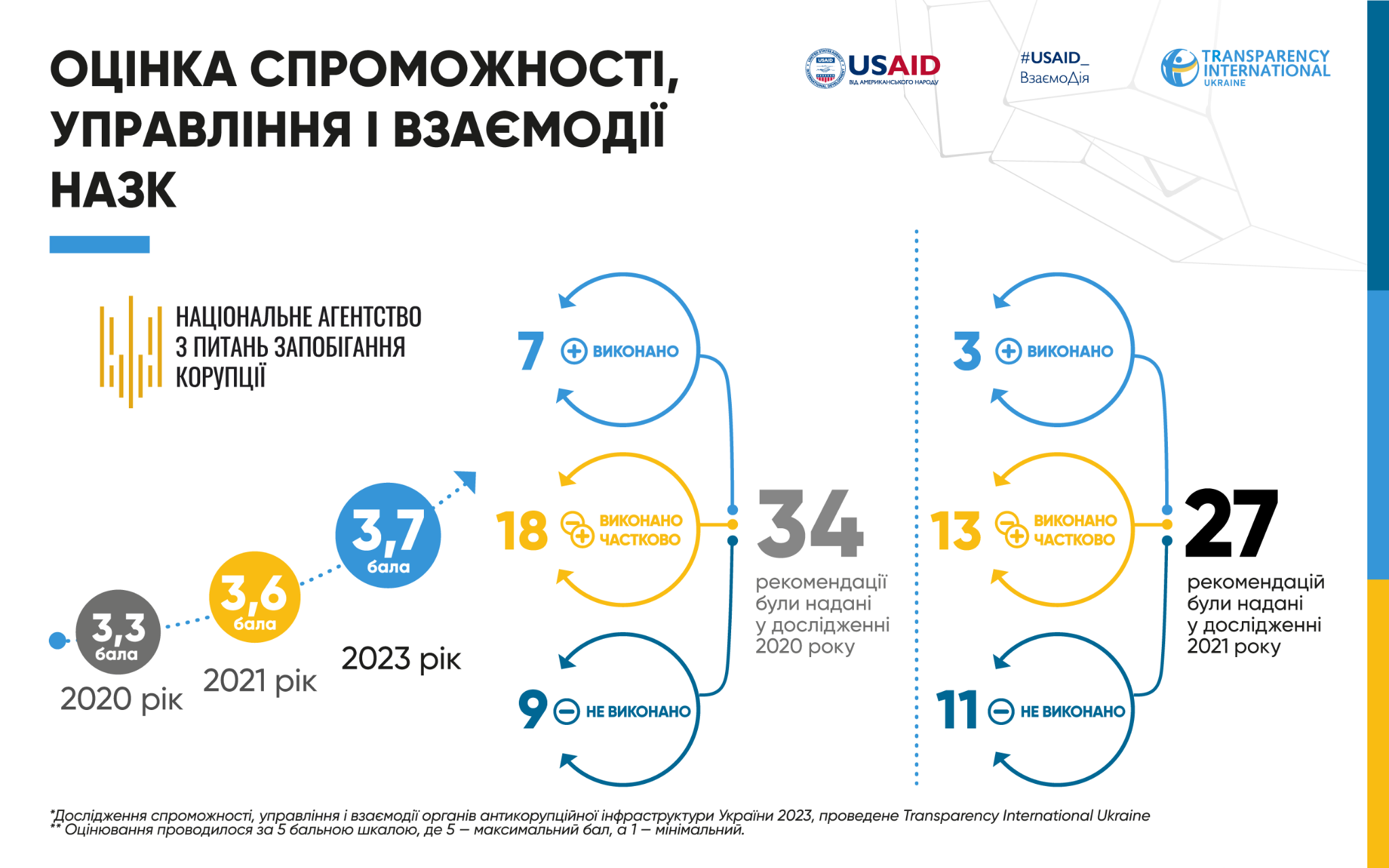
Созданное в 2015 году, НАПК уже в 2016-м начало свою официальную работу. Ранее орган имел коллегиальное руководство, впрочем, из-за коррупционных скандалов и недостаточной эффективности в 2020 году Агентство было перезагружено, и его возглавил единоличный руководитель — Александр Новиков. После перезагрузки НАПК пришлось выстраивать свою работу почти с нуля.
Кроме того, орган неоднократно сталкивался с попытками подорвать его институциональную состоятельность. Именно НАПК — тот орган антикоррупционной экосистемы, которому за последние три года после перезагрузки «прилетело» больше всего, в частности относительно разрушения его мандата и торможения процессов внешними игроками.
Самой скандальной такой попыткой стало решение Конституционного суда от 27 октября 2020 года, которое фактически отменило почти все полномочия Нацагентства. К счастью, Рада восстановила его функции уже через два месяца, и с тех пор учреждение не испытывало таких комплексных воздействий.
Похожим вызовом для Нацагентства стали ограничения, которые ввели с началом войны. Народные депутаты запретили НАПК проверять декларации чиновников и проводить спецпроверки, а также превратили обязанность декларирования в добровольное действие. Так же, как с началом пандемии COVID-19 приостановили обязанность политических партий подавать в Агентство свои финансовые отчеты на проверку. Собственно, среди всех антикорорганов такие «военные» ограничения больше всего затронули именно НАПК.
Также надо вспомнить затянутый со стороны парламента и правительства процесс принятия важных для нашей страны Государственной антикоррупционной стратегии и программы в 2020-2023 годах. Так, антикорстратегию народные депутаты приняли в ослабленной версии и только через 4,5 года после завершения действия предыдущей. А Государственную антикоррупционную программу утвердили с задержкой в два месяца после законодательного дедлайна — под призывы общественности и самого НАПК.
И здесь стоит вспомнить о кропотливой работе Агентства над подготовкой государственных антикорстратегии и антикорпрограммы. НАПК приобщило к разработке и широкому обсуждению этих документов все заинтересованные стороны, в том числе общественность, и такой открытый процесс бесспорно положительно сказался на конечном результате.
Можно признать, что перезагрузка НАПК таки состоялась. Мы больше не слышим о новых коррупционных скандалах в Агентстве и имеем ощутимый прогресс в вопросе формирования государственной антикорполитики — предыдущее коллегиальное НАПК полностью провалило разработку новой антикорстратегии в 2018-2019 годах.
Впрочем, к сожалению, нынешнее НАПК далеко не всегда пользуется принципом прозрачности, о чем уже не первый год говорят отечественные и международные эксперты. Более того, это стало одним из основных замечаний в сторону Агентства в отчете по результатам его первого независимого аудита.
В частности, аудиторы указали, что вопреки положениям Закона Украины «О доступе к публичной информации» НАПК не публикует в полном объеме собственных нормативно-правовых актов, актов индивидуального действия и проектов решений, подлежащих обсуждению. Не обнародовались также правила логического и арифметического контроля е-деклараций (несмотря на многочисленные призывы со стороны общественности к их обнародованию и совершенствованию) и ряд других документов, например правила проверки деклараций отдельных сотрудников СБУ, НАБУ и т.п. Заметим, что Еврокомиссия в своем отчете тоже подчеркнула, что недостатки в правилах автоматизированного контроля е-деклараций до сих пор существуют, и НАПК должно рассмотреть их в среднесрочной перспективе. Международные партнеры ждут этого от нас.
Не меньшая проблема — урегулирование и применение НАПК мониторинга образа жизни (МСЖ) декларантов. Общественность тоже уже не первый год широко критикует этот инструмент. Так, TI Ukraine еще в 2021 году опубликовала исследование с рекомендациями по устранению недостатков МСЖ.
Здесь следует упомянуть, что в том числе из-за недостатков в подходах Агентства к реализации своего мандата внешние аудиторы в 2023 году не смогли признать работу НАПК эффективной, зато они «не признали ее неэффективной». Несмотря на то, что результаты аудита Нацагентства не стали основанием для смены его руководства, аудиторы не признали выполненным критерий, касающийся именно Александра Новикова. Интересно, что сам глава НАПК, комментируя результаты аудита, поблагодарил Комиссию за «те из рекомендаций, которые помогут нам усилить свою роль в предотвращении и борьбе с нашим крупнейшим внутренним врагом — коррупцией», то есть фактически указал на то, что будет обращать внимание только на часть замечаний аудиторов, а не на все.
Поэтому оценивание работы Нацагентства по вопросам предотвращения коррупции свидетельствует о том, что большинство из описанных общественностью и международными экспертами проблем, которые не позволяют ему выйти на другой уровень состоятельности и эффективности, — это последовательная политика и подходы руководства. И это именно тот случай, когда решение проблем прежде всего зависит от инициативы изнутри учреждения.
И, безусловно, от адекватной реакции гражданского сектора и экспертов на публикацию отчета международного аудита НАПК. По сути, нам в руки дали реальный инструмент измерения эффективности работы ключевого антикоррупционного органа, за который мы сами боролись. Однако когда результаты обнародовали, то общественность в основном промолчала. И это минус, ведь тот, кто возглавит НАПК после, может не получить правильного сигнала.
Конкурс на нового руководителя НАПК начался 10 ноября, а срок полномочий Александра Новикова истекает в середине января 2024 года. Стоит только надеяться, что новоизбранный руководитель наконец разорвет «заколдованный круг» и сможет исправить уже хорошо известные недостатки НАПК.
Безрезультатная АРМА
Пятый элемент антикоррупционной экосистемы — АРМА. Это, пожалуй, наименее популярный орган, но определенно не наименее важный.
Агентство по розыску и менеджменту активов в нашем исследовании мы оценили на 3,4 балла из возможных пяти. И это худший показатель среди других органов антикоррупционной экосистемы. Почему же так сложилось?
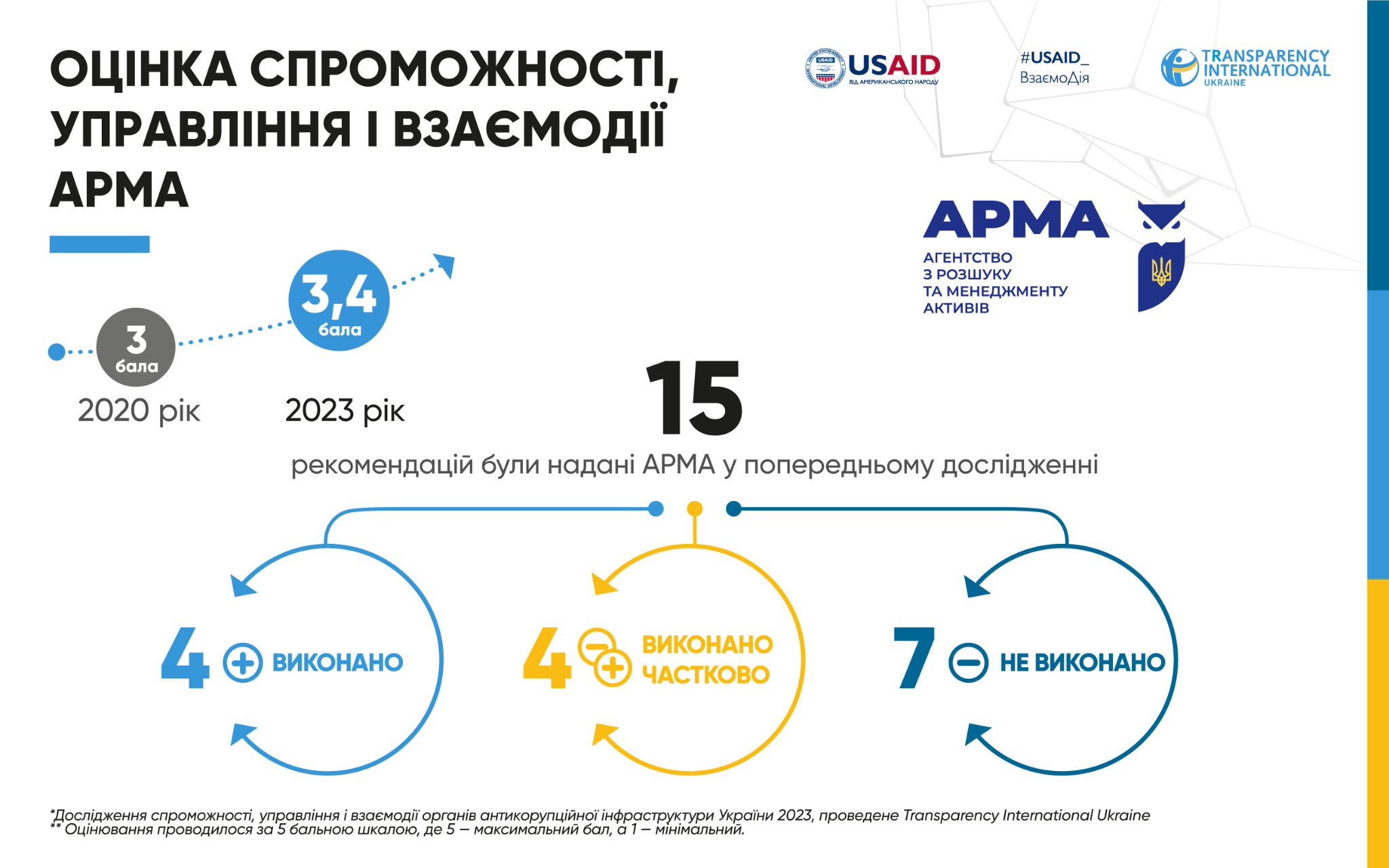
АРМА создали в 2016 году для поиска «преступных» активов и взыскания их в доход государства, а еще Агентство управляет арестованным имуществом. Здесь надо напомнить, что создание АРМА — одно из условий безвиза, поэтому на его работу годами обращали немало внимания.
И недаром. Ведомство постоянно критикуют как государственные, так и негосударственные и зарубежные деятели, а Еврокомиссия в своем отчете упомянула об Агентстве аж восемь раз.
Причин несколько. Первая и едва ли не самая заметная такова: сейчас, даже несмотря на семилетний срок существования АРМА, законодательная база деятельности, как и практика ее выполнения остаются не лучшими. И сколько бы общественность, в том числе и TI Ukraine, ни призывала парламент, некоторые крайне необходимые изменения не приняты до сих пор.
А еще Агентству не хватает независимого и профессионального главы, который сможет преодолеть «наследие» предыдущих руководителей и наладить плодотворную коммуникацию со стейкхолдерами. В течение всего срока нашего исследования АРМА оставалось без полноценного руководителя и, соответственно, было зависимым от того, насколько работой руководителя Агентства были довольны в ОП.
И, к сожалению, даже после назначения на должность главы АРМА Елены Думы некоторые из указанных проблем остаются актуальными. Собственно, Еврокомиссия в отчете тоже упомянула об обеспокоенности общественности относительно процесса отбора и назначения, а также добропорядочности новой руководительницы АРМА. За чуть более чем четыре месяца работы Елена Дума уже становилась предметом журналистских публикаций, и отдельно в них говорилось о неоднозначной кадровой политике новой главы.
Именно поэтому мы напоминаем о необходимости для парламента принять изменения в профильный закон об АРМА, а Кабмина — принять подзаконные акты, которыми Агентство будет руководствоваться в своей деятельности. По состоянию на сейчас отдельные акты уже приняты, в частности, о реализации арестованного имущества, а также о порядке отбора управляющих активов.
Небольшой прогресс в совершенствовании работы АРМА за последние три года все-таки состоялся. Конечно, многие из этих успехов были незаметны на фоне большой нагрузки Агентства активами с российским или белорусским следом, которая возникла после начала полномасштабного вторжения и углубила имеющиеся и высветила новые проблемы в работе органа. Несмотря на насущный запрос в розыске и конфискации таких преступных активов, пока мы практически не имеем примеров успешного возвращения этого имущества Украине. Со своей стороны Еврокомиссия тоже отметила, что инструменты конфискации и возврата активов используют в Украине недостаточно, а потому соответствующий опыт все еще необходимо приобрести.
Все это требует комплексного подхода к оценке работы АРМА, а также совершенствования законодательного обеспечения и улучшения практики работы органа. Причем подходить к реформированию Агентства следует взвешенно, без резких идей и полумер. Ведь поспешность и неоправданные шаги сейчас грозят обращениями в Европейский суд по правам человека и немалыми возмещениями владельцам арестованных активов потом.
Когда способность превратится в эффективность?
Наличие хорошей формы не сделает из гимнаста олимпийского чемпиона, и так же диплом инженера не станет предпосылкой для великих открытий. Но они дают возможность, базу. Так же и антикоррупционным органам нужны возможности для реализации возложенных на них функций.
После начала работы НАБУ, САП, АРМА, НАПК и ВАКС общество ожидало от них максимальной включенности. Однако одно лишь создание антикоррупционных органов, даже при выписывании, казалось бы, вполне вменяемого для их работы законодательства, не гарантирует, что эти институции сразу заработают удачно. К тому же мы уже увидели, что в процессе их работы почти всегда появляются уроки, которые надо изучить и соответственно усовершенствовать правовую рамку деятельности.
Из-за того, что создавались и запускались эти органы в разное время, даже при разной политической и общественной ситуации, их синхронизация между собой и с другими важными ведомствами задерживалась, тормозилась и не всегда была безоблачной. А такая система может работать только в полном взаимодействии и при абсолютной независимости от властного аппарата, представителей которого должна контролировать, проверять и при необходимости наказывать. Для этого ей, бесспорно, еще и необходимы очень компетентные и свободные от каких-то политических влияний кадры, а также правовые гарантии такой независимости.
Потому что какого бы высокого уровня учреждения мы ни построили, какой бы независимостью и полномочиями их ни наделили, ключевой останется этическая и моральная составляющая кадров, возглавляющих антикоррупционные органы и подающих соответствующие сигналы не только своим коллективам, но и всей стране. Украина проходит этап становления антикоррупционной структуры, где все ее институты проверяются на прочность именно кадрами. И это уже подтвердил кейс САП, где первым руководителем, оставившим «след», был Назар Холодницкий, а также НАПК, которое провалилось в своем коллегиальном формате под руководством Натальи Корчак. К сожалению, результаты аудита НАПК, которым руководит Александр Новиков, также подали красный сигнал. Действующие руководители САП и НАБУ проходят свои тесты на профессиональность и независимость. ВАКС ищет оптимальный формат руководства. Кадры, которыми наполняются институции, — основа того, в какую сторону они будут развиваться.
Однако за годы работы всем пяти органам антикоррупционной экосистемы так или иначе приходилось преодолевать вызовы. Некоторые из них, как определенная конфронтация между НАБУ и САП в 2017-2018 годах, на сегодняшний день удалось пройти. Другие, как частичное нежелание НАПК прислушиваться к рекомендациям партнеров, актуальны до сих пор. Но если оценивать именно возможности к антикоррупции, изменения уже заметны.
Пока непонятно, как быстро мы увидим безоговорочный результат. И здесь, к сожалению, как раз война может стать тем катализатором, который покажет, насколько способность соответствует готовности достигать результатов. Мы верим, что это возможно, потому что уже видим плоды работы антикоррупционной экосистемы. Но такой урожай, безусловно, должен стать еще больше. Чтобы в результате по примеру антикорблока мы смогли реформировать всю правоохранительную систему государства.


